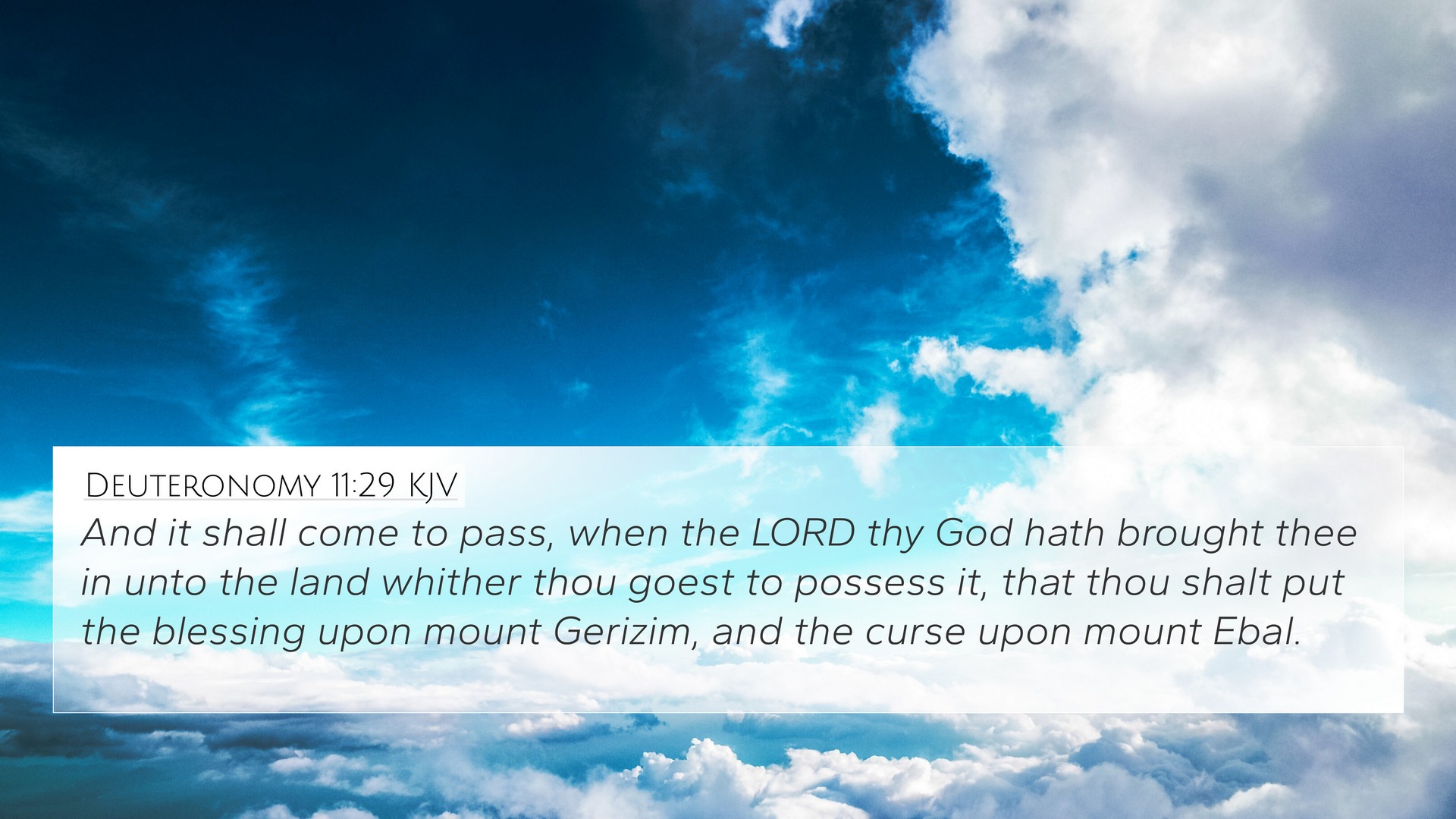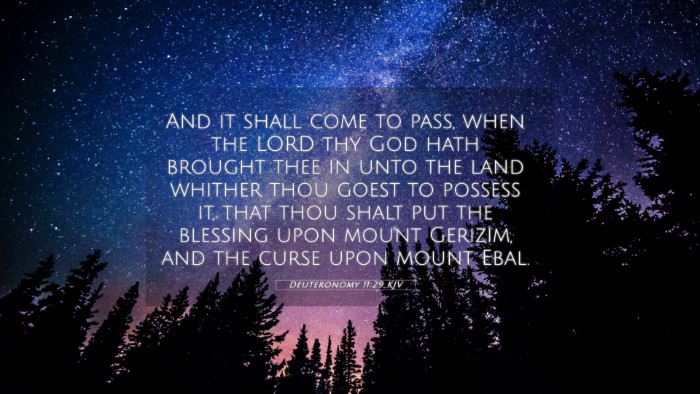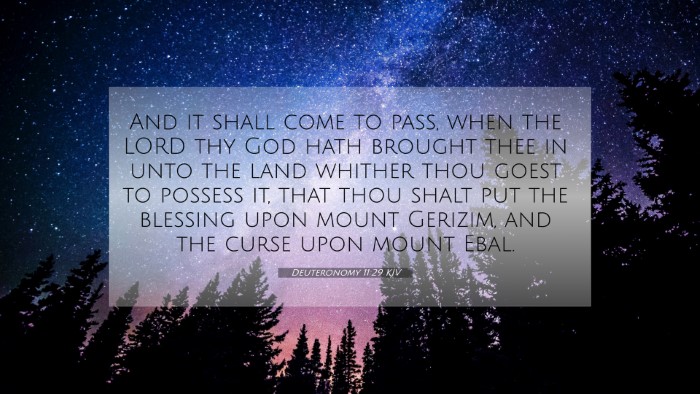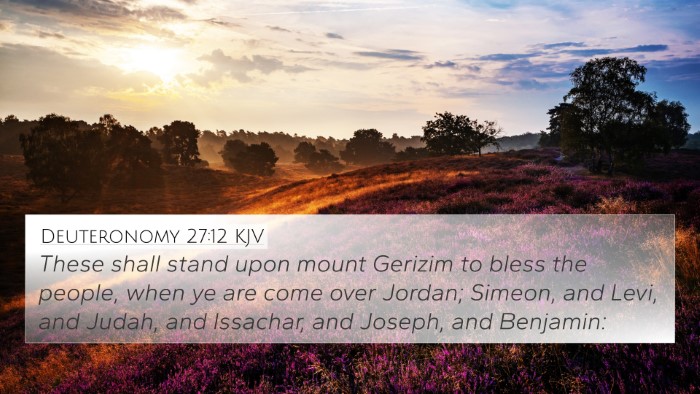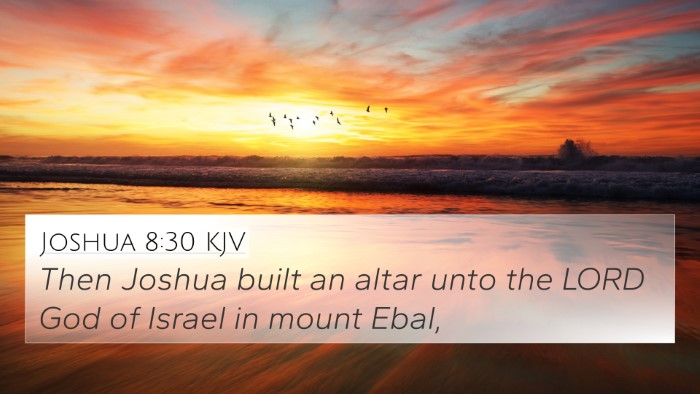Understanding Deuteronomy 11:29
The verse Deuteronomy 11:29 reads: "And it shall come to pass, when the Lord thy God hath brought thee into the land whither thou goest to possess it, that thou shalt put the blessing upon mount Gerizim, and the curse upon mount Ebal." This verse highlights a significant moment in the history of Israel as they prepare to enter the promised land. Various public domain commentaries provide insight into the meaning and implications of this scripture.
Context and Significance
In Deuteronomy, Moses addresses the Israelites on the threshold of the Promised Land. This verse illustrates the dual nature of blessings and curses associated with obedience and disobedience to God's covenant. The act of placing blessings on Mount Gerizim and curses on Mount Ebal serves as a vivid reminder of the choices that lead to life and prosperity versus death and adversity.
Interpretations from Prominent Commentators
- Matthew Henry: Henry emphasizes that the location of Mount Gerizim and Mount Ebal signifies the importance of choices in life. He notes that these mountains serve as physical reminders of the consequences of obedience and disobedience. The blessings bestowed on Gerizim illustrate God's favor, while the curses from Ebal signify his discontent.
- Albert Barnes: Barnes draws attention to the communal aspect of this scripture. He outlines how the future generations of Israel would benefit from this ceremony. He suggests that the blessings and curses represent a solemn covenant between God and His people, encouraging them to adhere to His commandments.
- Adam Clarke: Clarke provides a deeper historical context, explaining the geographical significance of the two mountains. He argues that the public proclamation of blessings and curses was vital for maintaining the community's focus on their covenant with God. He underlines the prophetic nature of these injunctions, hinting at the future of Israel based on their faithfulness.
Cross-References to Enhance Understanding
To better grasp the thematic connections within the Bible, it is beneficial to explore cross-references that relate to Deuteronomy 11:29. Below are some key verses that reinforce the themes of blessings, curses, and covenantal commitment:
- Joshua 8:33-35: The reaffirmation of blessings and curses at Shechem by Joshua continues the legacy of this tradition.
- Deuteronomy 27:12-13: Further expounds on the assignment of blessings and curses as the Israelites gather for the covenant renewal.
- Galatians 3:10-14: A New Testament reflection on the consequences of the law and the blessings that come through faith in Christ.
- Malachi 2:2: Addresses the results of turning away from God’s commandments, which can lead to curses instead of blessings.
- Matthew 5:10-12: Connects New Testament blessings with suffering for righteousness, illustrating an expansion of these older themes.
- Romans 2:6-11: Discusses God's impartial judgment and the ultimate outcomes of blessings and curses relating to deeds.
- Psalm 1:1-3: Sets the foundation for understanding the blessings that come from delighting in the law of the Lord.
Thematic Connections
This verse invites a comparative Bible verse analysis, emphasizing the eternal relevance of God's covenant through both testaments. The juxtaposition of blessings and curses serves as a clear illustration of the moral choices facing humanity. Understanding Deuteronomy 11:29 alongside the other cited verses provides a more comprehensive view of God's character, our role as His people, and the implications of our choices.
Using Cross-References for Deeper Study
To engage with scripture profoundly, individuals can utilize various Bible reference resources, such as a concordance or cross-reference Bible study guides. By identifying connections between Old and New Testament scriptures, readers can explore themes of divine judgment, grace, and the covenantal relationship God desires with His people.
Tools for Bible Cross-Referencing
- Bible Concordance: Essential for locating verses on specific topics and understanding scripture in depth.
- Cross-Reference Bible Study: A method to connect scriptures that inform and complement each other.
- Comprehensive Bible Cross-Reference Materials: Resources designed to aid researchers in biblical studies effectively.
Conclusion
In summary, Deuteronomy 11:29 encapsulates a crucial aspect of the covenant relationship between God and Israel. The physical act of assigning blessings and curses serves as a powerful reminder of the spiritual commitments that permeate the biblical narrative. Through careful study, including cross-referencing with related scriptures, believers can glean timeless truths about God's love, justice, and expectations for His people.
